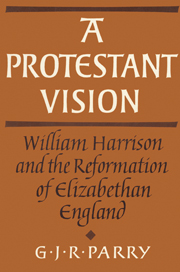6 - A reformed commonwealth
Published online by Cambridge University Press: 20 October 2009
Summary
The history of the True Church showed William Harrison that the human institution of perpetual monarchy was inherently unable to overcome worldly considerations in order to achieve a full reformation. Yet this bitter lesson contradicted his careful acknowledgement that the presbyterians, whose historical vision of the True Church he shared, threatened dangerous social upheaval in their attempts to reconstruct the godly society without tarrying for the magistrate. Despite his low opinion of princes in general, Harrison had dutifully to suspend his disbelief about Elizabeth's commitment to further reformation. This tension can be partly resolved by an examination of Harrison's views about England's relationship to the ideal godly commonwealth, but an element of incoherence must always be allowed for in his thought, since he belonged to that historical majority of individuals whose less than rigorous thinking allowed them to accept simultaneously a number of logically contradictory propositions. Harrison's very situation encouraged such a lack of rigour, and his subjective interpretation of his contemporary political, social and economic environment also partly explains why this tension never became a destructive element in his thought, why he never developed his views to their logical, extreme conclusion. In this connection we have seen how on different occasions the actions of the political elite both dispelled Harrison's doubts and revived them.
- Type
- Chapter
- Information
- A Protestant VisionWilliam Harrison and the Reformation of Elizabethan England, pp. 244 - 289Publisher: Cambridge University PressPrint publication year: 1987

